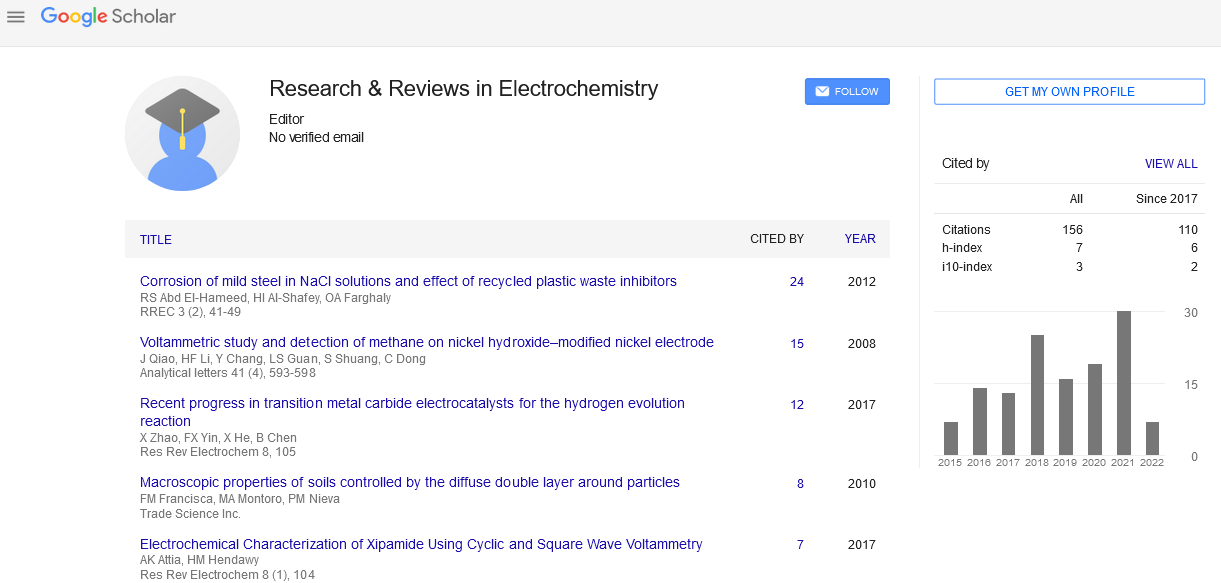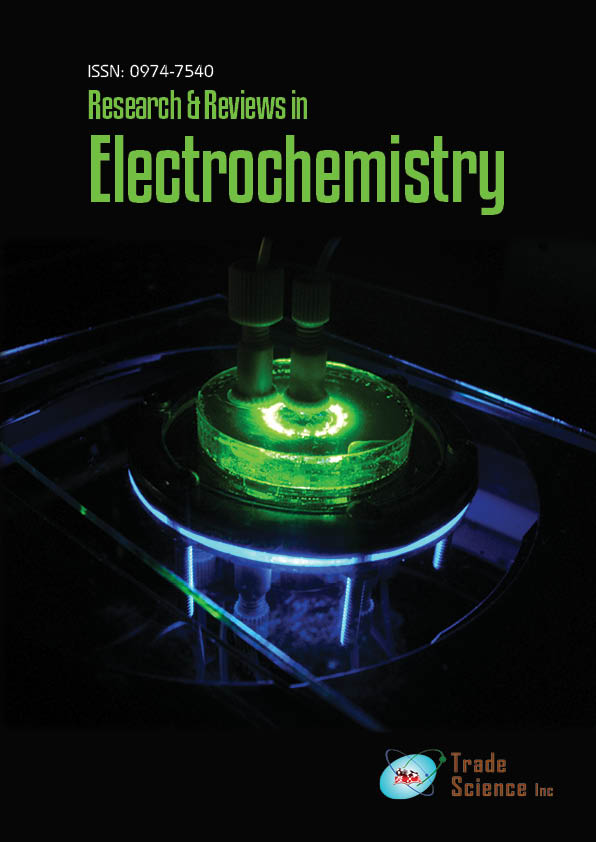About
Research and Reviews in Electrochemistry is a premier open access journal devoted to publishing research that demonstrates significant scientific discoveries in all areas of electrochemistry. The Journal welcomes the following article types: Editorial, Commentary, Hypothesis & Theory, Methods, Mini Review, Opinion, Original Research, Perspective, Review, short communications, and rapid communications.
Aims and Scope
The journal aims to bring cutting-edge research across the entire spectrum of electrochemical science emphasizing the application of electrochemistry to technological development.
Its scope encompasses, but is not limited to the following fields:
- Electrochemical energy conversion, conservation, and storage
- New battery systems, fuel cells, super capacitors
- Solar cells, power delivery, industrial synthesis
- Environmental remediation, cell design, corrosion
- Electric and magnetic field effects
- Computational and theoretical electrochemistry
- Electrochemical reaction engineering
- Bioenergetics and signal transduction
- Biomembranes and model membranes
- Medical applications of electrochemistry and bio-electrochemistry
- Electrochemical treatment of effluents
- Molten state and solid state electrochemistry
- Surface finishing, electroplating, electrodeposition
- Sensors, and applications of molecular electrochemistry
Indexed in Directory of Research Journals, Google Scholar, Scholar Article Impact Factor(SAIF), CNKI, Open J-Gate and Secret Search Engine Labs
Submission Portal: Online Submission System or submission can be sent as an attachment to: publisher@tsijournals.com
Fast Editorial Execution and Review Process (FEE-Review Process):
Research & Reviews in Electrochemistry is participating in the Fast Editorial Execution and Review Process (FEE-Review Process) with an additional prepayment of $99 apart from the regular article processing fee. Fast Editorial Execution and Review Process is a special service for the article that enables it to get a faster response in the pre-review stage from the handling editor as well as a review from the reviewer. An author can get a faster response of pre-review maximum in 3 days since submission, and a review process by the reviewer maximum in 5 days, followed by revision/publication in 2 days. If the article gets notified for revision by the handling editor, then it will take another 5 days for external review by the previous reviewer or alternative reviewer.
Acceptance of manuscripts is driven entirely by handling editorial team considerations and independent peer-review, ensuring the highest standards are maintained no matter the route to regular peer-reviewed publication or a fast editorial review process. The handling editor and the article contributor are responsible for adhering to scientific standards. The article FEE-Review process of $99 will not be refunded even if the article is rejected or withdrawn for publication.
The corresponding author or institution/organization is responsible for making the manuscript FEE-Review Process payment. The additional FEE-Review Process payment covers the fast review processing and quick editorial decisions, and regular article publication covers the preparation in various formats for online publication, securing full-text inclusion in a number of permanent archives like HTML, XML, and PDF, and feeding to different indexing agencies.
Blur NFT marketplace dynamics redefine how we engage with digital art. Immerse yourself in a community where NFTs become more than tokens—they become a symbol of artistic expression and ownership.*2016 Journal Impact Factor was established by dividing the number of articles published in 2014 and 2015 with the number of times they are cited in 2016 based on Google search and the Scholar Citation Index database. If 'X' is the total number of articles published in 2014 and 2015, and 'Y' is the number of times these articles were cited in indexed journals during 2016 then, impact factor = Y/X
h-index
Articles published in Research & Reviews in Electrochemistry have been cited by esteemed scholars and scientists all around the world. Research & Reviews in Electrochemistry has got h-index 7 , which means every article in Research & Reviews in Electrochemistry has got 7 average citations.
Recently Published Papers
Redox Electrolytes for Supercapacitors
Author(s): Jacob Koehler
Because of their short charging/discharging time, long cycle life, and good temperature characteristics, supercapacitors (SCs) have received a lot of attention. Electrolytes have been ident..
Viewpoint, . 2022 Vol: 12( 4)
Asymmetric Activated Carbon/Activated Carbon Capacitors Design
Author(s): Gary Lu
Supercapacitors are energy storage devices that, when compared to batteries, has a high power density but a low energy density. Their low energy density can be overcome by employing an asym..
Short commentary, . 2022 Vol: 12( 4)
Materials Considerations for Flexible Supercapacitors
Author(s): Gary Charles
Flexible supercapacitors are very appealing for a wide range of emerging portable lightweight consumer devices. The incorporation of a flexible electrode or substrate material to combine st..
Viewpoint, . 2022 Vol: 12( 4)
Graphene oxide improves electricity generation in soil microbial fuel cells and plant microbial fuel cells.
Author(s): Gary Charles
Graphene oxide (GO) was studied for its effects on electricity generation in soil microbial fuel cells (SMFCs) and plant microbial fuel cells (PMFCs). GO was added to soil at concentrations ..
Letter to the Editor, . 2022 Vol: 12( 4)
Properties and Electro catalytic Applications of Carbon Quantum Dots
Author(s): Sara Brown
Luminescent Carbon Quantum Dots (CQDs) are a new type of nano-carbon material that has received a lot of attention recently, especially in chemical sensors, bio-imaging, nanomedicine, solar..
Viewpoint, . 2022 Vol: 12( 4)

